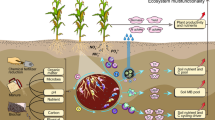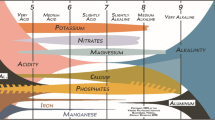Abstract
The effects on soil condition of increasing periods under intensive cultivation for vegetable production on a Typic Haplohumult were compared with those of pastoral management using soil biological, physical and chemical indices of soil quality. The majority of the soils studied had reasonably high pH, exchangeable cation and extractable P levels reflecting the high fertilizer rates applied to dairy pasture and more particularly vegetable-producing soils. Soil organic C (Corg) content under long-term pasture (>60 years) was in the range of 55 g C kg–1 to 65 g C kg–1. With increasing periods under vegetable production soil organic matter declined until a new equilibrium level was attained at about 15–20 g C kg–1 after 60–80 years. The loss of soil organic matter resulted in a linear decline in microbial biomass C (Cmic) and basal respiratory rate. The microbial quotient (Cmic/Corg) decreased from 2.3% to 1.1% as soil organic matter content declined from 65 g C kg–1 to 15 g C kg–1 but the microbial metabolic quotient (basal respiration/Cmic ratio) remained unaffected. With decreasing soil organic matter content, the decline in arginine ammonification rate, fluorescein diacetate hydrolytic activity, earthworm numbers, soil aggregate stability and total clod porosity was curvilinear and little affected until soil organic C content fell below about 45 g C kg–1. Soils with an organic C content above 45 g C kg–1 had been under pasture for at least 30 years. At the same Corg content, soil biological activity and soil physical conditions were markedly improved when soils were under grass rather than vegetables. It was concluded that for soils under continuous vegetable production, practices that add organic residues to the soil should be promoted and that extending routine soil testing procedures to include key physical and biological properties will be an important future step in promoting sustainable management practices in the area.
Similar content being viewed by others
Author information
Authors and Affiliations
Additional information
Received: 18 November 1997
Rights and permissions
About this article
Cite this article
Haynes, R., Tregurtha, R. Effects of increasing periods under intensive arable vegetable production on biological, chemical and physical indices of soil quality. Biol Fertil Soils 28, 259–266 (1999). https://doi.org/10.1007/s003740050491
Issue Date:
DOI: https://doi.org/10.1007/s003740050491




